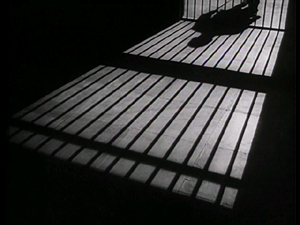d. Fritz Lang
Starring Brian Donlevy, Walter Brennan, Anna Lee and Gene Lockhart
A while back, the talented David Cairns posted an excellent tribute to the obscure noir/WWII film THE DEVIL STRIKES AT NIGHT by the German transplant/film director Robert Siodmak. It's an amazing reversal of audience sentiment, drawing us in with a traditional procedural, then reversing our sympathies and expectations by having the procedural aspects conducted by the Gestapo. It ends up being a damning condemnation of Nazi Germany because of the way even the most normal and necessary elements of civilization get perverted in the name of racist ideology and a refusal to confess weakness.
By the end of Hangmen Also Die! (one of two Hollywood efforts to dramatize the assassination of Reinhard Heydrich) Lang's direction and Brecht's script accomplishes a similar feat. Instead of perversely wishing that the Gestapo actually succeed in their goal of catching a man, I find myself sympathizing with a Nazi collaborator and traitor who is being pursued and prosecuted for a crime he never committed. Even though this man is complicit in the regime's crimes, we see the ways in which an ideologically corrupt government ends up obliterating the one man who should offer them no threat.
Some credit should also go to Gene Lockhart, who portrays his Quisling brewer Emil Czaka in a way that makes us despise him when he is riding high on the Nazi bandwagon, but whose very childish selfishness makes him pitiful when the world stops making sense. He's certainly evil and we want him punished, but, like Kafka's narrator in The Trial, we remember that feeling of guilt and the worry that whatever we're being punished for, it's for that crime that no one knows.
The complicated element, however, is that this is the thing that sticks with us at the end, the Quisling, the monster, being hunted down by his own kind, reality turned against him.
There certainly are a lot of intentional echoes of M in the end.
[ Sidenote: Record shows that Brecht was quite dissatisfied with this film, the only film project of his Hollywood years to reach completion. He felt that the script was watered down and the film was buried. Certainly the imbalanced nature of the film suggests he was right. On the other hand, Brecht the theorist often contradicted the results of Brecht the author. We need merely look at Mother Courage and Her Children for an example of how they disagree. The theorist thinks Mother Courage is a ridiculous, even monstrous figure at the end of the play, but the author has created someone we pity and admire.
Looking at the picture as a piece of the Brecht canon, there certainly are a lot of elements that strike me as Brechtian. Ideologically, the film is obsessed with the importance of mutual cooperation and, more importantly, the way the needs of the many outweigh the desires and petty moralities of the few. Again and again, a character is forced to embrace a behavior that is normally wrong, such as Nasha faking unfaithfulness or Svodoba refusing to take responsibility for his actions, because of the greater need of the group.
Also, there is a keen insight into the way groups and hierarchies function that represent the Brechtian fascination with the street scene. The opening, in which a crowd of industrialists and bureaucrats argue as they wait for the Reichsprotector, for example, highlights the contradictory impulses and desires of the toadies in the corporatist fascist state in an efficient and telling way. The same in a street scene where Anna Lee's attempts to reach Gestapo headquarters is discussed by the community, which then bands together to ostracize her.]
That's not to say that the rest of the film is bad or uninteresting. Fritz Lang is directing with James Wong Howe as his DP! The whole film plays out in a real world played by people so varied and homely in appearance (even our leads, when they are good-looking, are of boys and girls next door type) that even the smallest part is given the lived-in feel of a sketch or a woodcut.
And there really is an amazing visual eye and design sense to the film, like in a Gestapo investigator's office that is filled with clearly looted furniture and art mingled with shabby office furniture, or a horrifying series of sequences in Gestapo headquarters that pave the way for Orwell's description of similar spaces in 1984.
One of several arresting images from the Gestapo HQ sequence.
There's so much to talk about here, from the daring and effective decision to have the Germans speak in German while the Czechs speak English, to the weird sense of dissonance brought on by Walter Brennan pretending to be an intellectual European when you want him to be croaking at John Wayne, to the way that Alexander Granach's Gestapo officer comes off as a perverse, sadistic but compelling version of Hercule Poirot.
But I'd rather encourage you to watch the film yourself and come back and leave your thoughts in the comments. It really is an amazing, under-rated film that deserves further exposure.
This blog post is part of the For the Love of Film (Noir) Blog-A-Thon, which is raising money to restore the influential but obscure noir The Sound of Fury. If you are interested in donating to this important cause, click here.






3 comments:
I am a huge fan of Brecht and an adherent of his theories of epic theatre and distantiation, so learning about this film was a great joy. Thanks for participating in the blogathon with such a wonderful contribution.
I didn't even know Brecht had written a finished Hollywood picture. I'm on the lookout for this film, if only for Walter Brennan.
You're right, it's a good movie. The story of Reinhold Heydrich and the brave men who assassinated them is always interesting.
Post a Comment